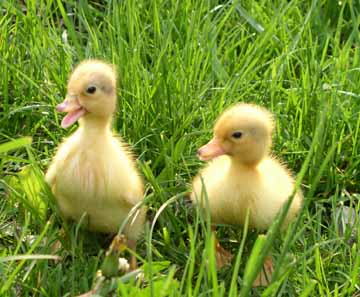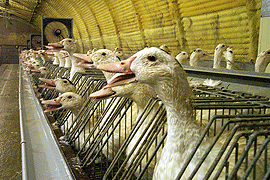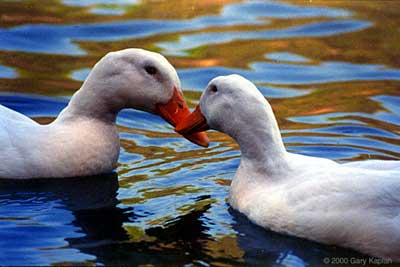 Is it OK to buy goosedown or duckdown duvets and pillows?
Is it OK to buy goosedown or duckdown duvets and pillows?
By Leo Hickman
Down, the soft lining found under the exterior feathers of waterfowl such as ducks and geese, has been prized for centuries for its insulating properties and its softness, which makes it ideal for use in bedding. In theory, as the down moults naturally from these birds, they shouldn't mind if we take it. But the reality is that down is almost always the by product of keeping millions of birds around the world in battery-cage conditions for cheap meat, or foie gras.
If the bird is lucky it will be stripped of its down once killed, but in some countries, particularly eastern Europe and Asia, where the vast majority of down is farmed, live plucking is routine as it produces a higher yield.
Every six weeks or so after the bird is eight weeks old the down from its breast is "ripped", as the process is known.
 Some claim this harvesting is harmless and akin to shearing sheep for wool, but the bird is typically hung upside down and first subjected to a test whereby the breast is plucked to see if it bleeds. (If so, the goose or duck will be left until the down is "ready".)
Some claim this harvesting is harmless and akin to shearing sheep for wool, but the bird is typically hung upside down and first subjected to a test whereby the breast is plucked to see if it bleeds. (If so, the goose or duck will be left until the down is "ready".)
Until there is a cast-iron certification scheme that guarantees meaningful animal welfare standards, buying down products carries the high risk of making you complicit in this industry. Both Marks & Spencer and the Co-op state they do not use down from birds that have been plucked live.

The much-prized eider down - from the protected eider sea-duck - is claimed to be more sustainable as it is taken from seashore nests, after the ducklings have left. However, animal-rights groups, such as Peta, still condemn the practice as exploitative.
Alternatives don't offer much comfort. For example, polyester is typically a byproduct of the oil industry and causes side-effects in many users.
It is possible to get buckwheat or millet hull pillows. Some makers are even using kapok, which comes from the pods of the Asian ceiba tree. There are many suppliers to be found online.
guardian.co.uk © Guardian News and Media Limited 2008
Leo Hickman is the Guardian’s green guru and the author of A Good Life: The Guide to Ethical Living
